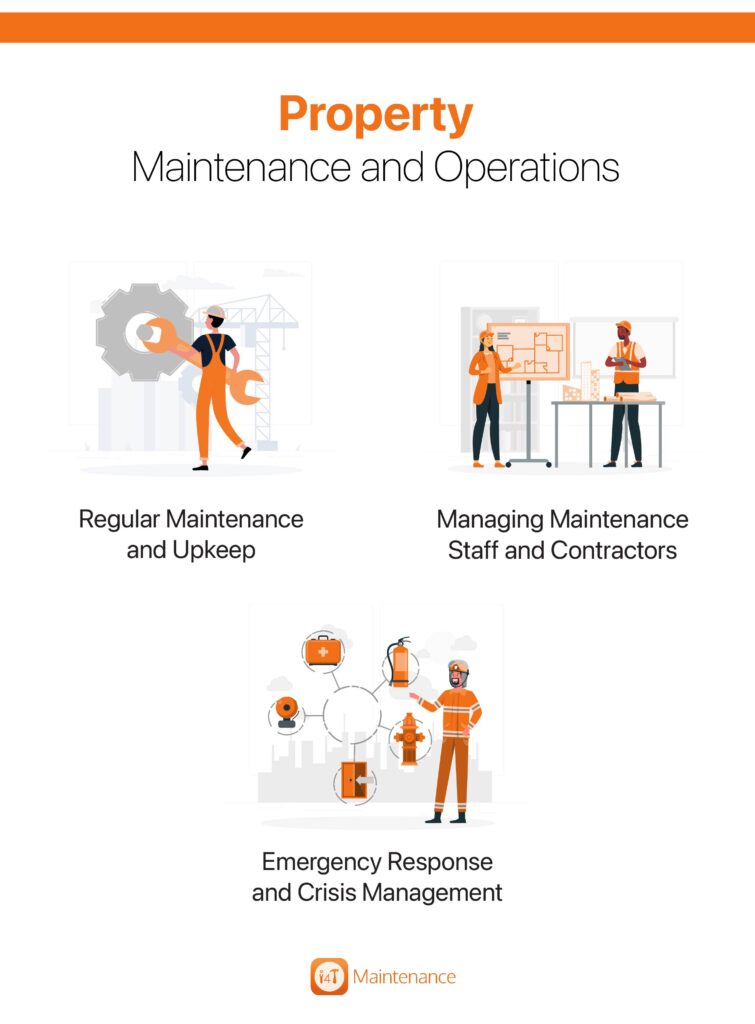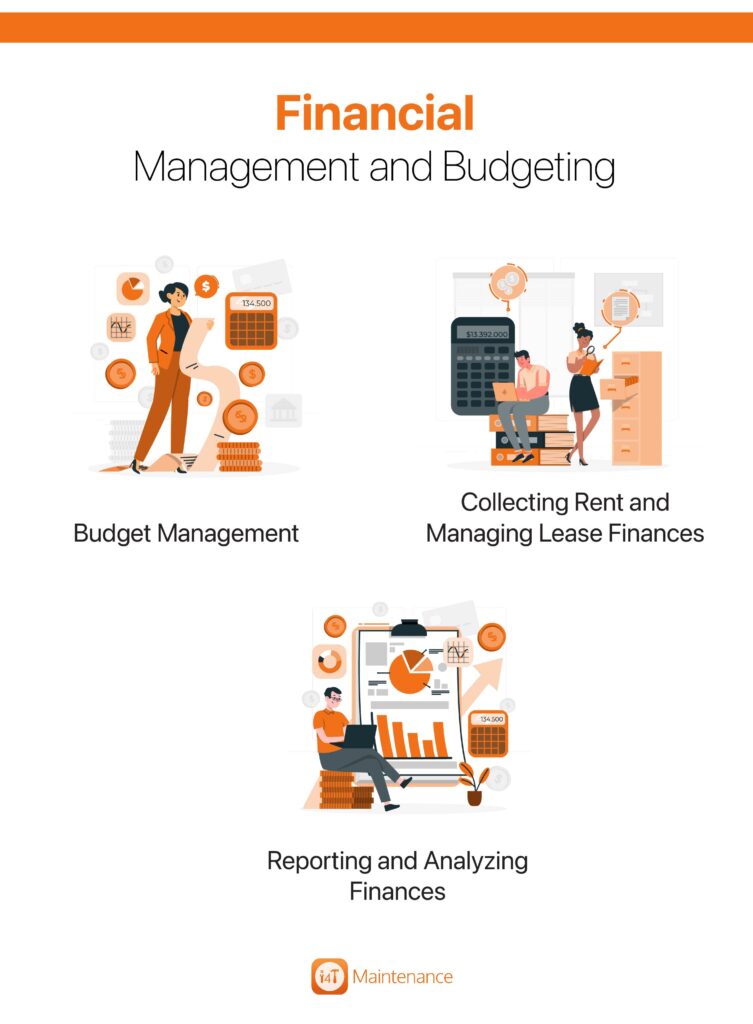A commercial property manager plays a crucial role in the real estate sector. They are responsible for overseeing commercial properties like office buildings, shopping centers, and apartment complexes. Their main goal is to keep these properties running smoothly, ensuring they are well-maintained, profitable, and appealing to tenants and visitors.
According to the U.S. Bureau of Labor Statistics, employment in this field is projected to grow by 5% from 2022 to 2032, which is faster than the average for all occupations. Moreover, Approximately 35,900 job openings for property, real estate, and community association managers are projected each year over the decade. These stats highlight the importance of a commercial property manager and the vital functions they perform.
Let’s explore what these functions are in more detail.
Tenant Relations and Lease Management

In commercial property management, handling tenant relationships and managing leases are key tasks.
This role is not just about paperwork; it’s also about keeping tenants happy and making sure everything runs smoothly.
1. Ensuring Tenant Satisfaction:
Building good relationships with tenants is important. This means regularly getting their feedback, understanding what they need, and proactively handling their problems.
2. Looking After Leases:
Smartly negotiating leases ensures it work well for both the property manager and the tenant. This involves discussing terms and rates and understanding the tenant’s business needs. Additionally, strategies for renewing leases, like offering special deals or flexible terms, can help keep tenants around. Commercial property managers must also ensure that all lease agreements keep up with changes in real estate laws and other regulations.
3. Using Technology in Lease Management:
Property management software can make managing leases easier, from keeping track of lease details to sending out reminders about rent increases or renewals. It can also make communicating with tenants, easier and more efficient.
Property Maintenance and Operations

Keeping a commercial property in good shape and running smoothly is one of the vital roles that a property manager plays.
This includes regular upkeep, managing service suppliers who do the maintenance work, and being ready for emergencies.
1. Regular Maintenance and Upkeep:
Carrying out routine inspections helps catch small problems before they get bigger. This means checking things like heating, air conditioning, and plumbing. Property managers must make sure to have a preventive maintenance plan in place to avoid any downtime on commercial properties as it can mean lost business. Outdoor maintenance is as important as indoor maintenance, hence areas like the walkways and gardens need to be kept well too.
2. Managing Maintenance Staff and Contractors:
Not having a reliable service supplier when you need them can put you in a lot of trouble. Property managers must handle maintenance staff well and plan their work to ensure availability. This also means that you need to have a good relationship with outside contractors and service providers to get work done on time and at a good price when needed. Property managers must also ensure the maintenance team knows about safety when performing work on properties.
3. Emergency Response and Crisis Management:
It’s important to plan for emergencies, like power cuts or natural disasters. Being able to provide a fast response in case of emergencies is crucial. This helps reduce damage and keeps tenants from being too disrupted. It is also vital to educate tenants on what to expect during emergencies. Letting them know what’s happening and what’s being done to fix it helps maintain trust and safety.
Financial Management and Budgeting

Handling the money side of commercial property management is a critical responsibility that property managers have to perform.
This includes everything from making budgets to collecting rent and keeping track of how the property is doing financially.
Good financial management is key to making sure the property keeps making money and stays financially healthy.
1. Budget Management:
From setting up the annual budget to regularly checking and adjusting it, commercial property managers need to make several smart financial choices. These can be in terms of better strategies for collecting rent to finding a supplier that doesn’t charge too much for repairs and maintenance. They also need to allocate funds for utilities and staff pay.
Planning for big costs, like upgrading the property, is also a major part of budgeting and directly affects the property’s value and income.
2. Collecting Rent and Managing Lease Finances:
Having a good system for collecting rent is crucial. Using online payment methods can make it easier and faster. Another critical function of successful property management includes taking care of the financial parts of leases, like setting rent prices, changing rents, and dealing with late payments and lease renewals.
3. Reporting and Analyzing Finances:
Commercial property managers are required to give regular financial updates to the property owners as per real estate financial reporting methods. These reports show how much money is coming in and going out and where costs can be cut. It reflects the property’s overall financial health and that everything has been done in compliance with the law.
Marketing and Leasing Strategies
For those managing commercial properties, it’s really important to have good plans for marketing the property and handling the leasing process. This means finding ways to attract new tenants and making sure the process of getting them to sign a lease goes smoothly.
1. Making a Marketing Plan:
As a starting point, commercial property managers need to understand what kind of property they are handling and who is most likely to rent the space. This could be certain types of businesses or stores, depending on what kind of property it is. Property managers need to try different ways to advertise it and highlight the property’s best features.
2. Setting Up Leasing Strategies:
From setting competitive pricing to offering flexible lease options and giving some perks to attract new tenants, property managers must do their homework when deciding on leasing strategies to make the property more appealing.
3. Handling the Leasing Process:
An important role of commercial property managers includes making the application process easy and checking potential tenants’ backgrounds when screening. Once done, they need to negotiate lease terms, get them signed, and welcome new tenants to the property. Helping new tenants get settled is important. This includes giving them all the necessary information and ensuring their space is ready.
Risk Management and Compliance
For those managing commercial properties, handling risk management is important, and ensuring everything complies with laws and safety rules. This means making sure the property follows all the legal requirements and putting in place plans to protect the property and its value.
1. Following Legal and Safety Rules:
Keeping up with local, state, or federal laws is crucial for commercial property managers. This ensures that properties remain upto building codes and commercial property compliance guidelines on safety. For this, property managers conduct regular inspections that help catch and fix any issues quickly. They also ensure that tenants follow all the necessary regulations in how they use the property.
2. Setting Up Risk Management Plans:
Commercial properties face several risks like natural disasters, fire hazards, or security issues. Identifying these risks and making a plan to mitigate them is a vital function of property managers. This could include installing safety systems, getting the right insurance, or having emergency plans in place. It’s important to note that the nature and intensity of risks can change over time. Hence plans need to be regularly reviewed and updated to handle new challenges.
3. Protecting the Property’s Value:
Commercial properties experience more risks than residential properties. Hence, having good insurance for things like damage to the property or legal issues is a basic part of protecting its value. Property managers must also consider strategies to mitigate financial risks and risks concerning tenant information and privacy. All of which can land them into legal trouble if not handled properly.
Sustainability and Technological Integration
In managing commercial properties today, focusing on being environmentally friendly and using technology remains vital. It’s not just good for the planet, but it also makes managing properties more efficient and can save money.
1. Focusing on Being Environmentally Friendly:
From energy saving, to water conservation and using eco-friendly building materials, being environmentally friendly helps commercial property managers attract environment-conscious businesses.
2. Using Technology to Manage Properties Better:
Property maintenance management software makes it easier to handle things like talking to tenants, managing work orders, and keeping track of suppliers. On the other hand, smart building tech automatically controls lighting and heating helping in managing energy use and cutting costs. There are also several tools that property managers use to analyze data that can help in making smart decisions on keeping the property functional and valuable.
Wrapping up
Being a successful commercial property manager involves handling many important tasks that are key to making real estate investments work well.
These include tenant and lease management, property maintenance, budgeting, marketing, compliance management, implementing sustainable practices, and technology integration.
i4T Maintenance is a highly innovative and tech-driven property maintenance management platform that helps commercial property managers with property maintenance and upkeep, tenant communication, and supplier management. It also ensures the property is a safe, compliant, and appealing space for tenants, underlining the pivotal role of property managers in the real estate sector.
Want to know more about how i4T Maintenance is making the lives of commercial property managers easier? Book a Demo today!
FAQs
They take care of commercial buildings, like handling the needs of tenants, keeping the building in good shape, and looking after the property’s money matters.
i4T Maintenance is a tech tool that makes it easier to fix and maintain the property, talk to tenants, and work with service suppliers.
Keeping tenants happy is key because it means they’re more likely to stay longer, which keeps the property occupied and ensures a steady flow of rent.
Using tech tools like i4T Maintenance can make managing the property smoother, improve communication, and save money and time in maintaining the property.
A property manager is important for keeping the property valuable, making sure it earns money, and handling any risks, which all help in making the real estate investment successful.

